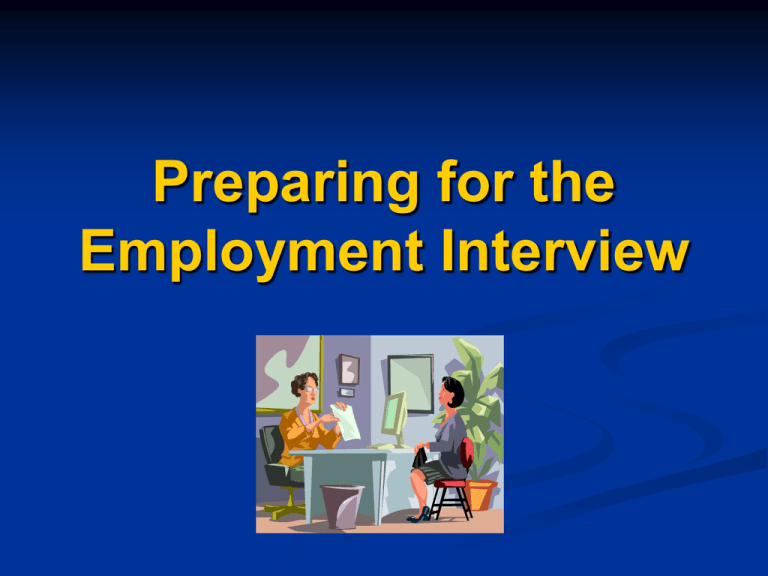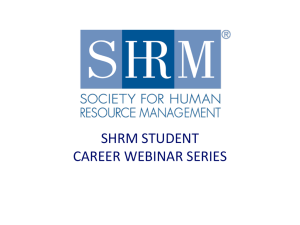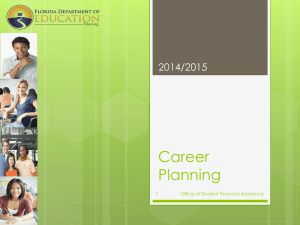ppt
advertisement

Preparing for the Employment Interview Identify the #1 Obstacle to Your Getting a Job Write it down on the paper in front of you, Then ……………… Agenda The Resume Scheduling the Interview What you should know before the interview What is your goal in the interview? Developing Your Interview Strategy. Questions your interviewer may ask you Questions to ask your interviewer Body Language Cues The Interview Do’s and Don’ts 10 Biggest Job Interview Blunders Invest in Yourself and Keep Yourself Up-to-Date The Resume A good resume will not get you a job offer but will help get you an interview. Some tips: Important, but not critical, to limit the resume to one page Chronological order by job, most recent job first Don’t go back more than 15 years unless to show experience or skills critical to job being applied for Focus on job functions, responsibilities and accomplishments that align with job being applied for. Don’t just describe activities. Be specific, where possible- increased sales X%, managed Y people, reduced expenses $Z. Use short, descriptive phrases, not extensive and wordy text What you should know before the interview •What position are you interviewing for? •Who is the employer? What industry, size, history? •Who will be interviewing you? Human Resources, your manager, co-worker? •Research the company and industry. Read the company’s mission statement. What is your goal in the interview? Developing Your Interview Strategy •You must understand the objective you want to achieve. •Market yourself- you are the “product” you want your prospective employer to invest in. You will help solve the company’s problem. Focus on how the company will benefit by hiring you, not how you will benefit. •What are the most important 3, 4, 5+ aspects of your character, abilities, talents and skills (CATS)? Are they critical for the job? CATS Inventory My CATS CATS Interviewer Desires 1. 1. 2. 2. 3. 3. 4. 4. 5. 5. Do your CATS equal or exceed the CATS required for the job? Tips for Answering Questions Try to use the key words when describing your skills – accountable, responsible, reliable, honest, committed, dedicated, hard-working, loyal, team player, trustworthy, wellorganized, quick learner, persistent, creative, innovative, resourceful, pro-active, flexible, adaptable, competitive, like to be challenged, multi-tasker, responsive, decisive, problem solver, experienced, goal-oriented, drive for results, handle ambiguity, meet deadlines, leadership qualities, detail-oriented, tactful, selfconfident. Give examples from your employment history and experience to support your response. SAY Your Interview Strategy S-promote your SKILLS A- validate your skills with ACTUAL examples Y- focus on how to help YOU (the employer) Questions Your Interviewer May Ask You ?????????? General Questions 1. Tell me about yourself. 2. Anything on your resume. 3. How will this company benefit by hiring you? 4. Why do you want to work at this company? 5. What in your experience indicates you are a good candidate for this job? General Questions (cont.) 6. What do you hope to find out during the interview process that will help you decide whether you want to work at this company? 7. What do you feel is your greatest accomplishment? Why? 8. What are your strongest job-related skills? 9. What job-related skill do you feel is your greatest development opportunity? General Questions (cont.) 10. What attracts you to this type of work? 11. What motivates you to do a good job? 12. What do you do outside work? 13. Where do you see yourself five years from now? 14. Why should we select you over other top candidates? Job-Related Questions 1. What do you think this job entails and what might you like or dislike about the work. 2. How would you respond to a customer, client, or employee who complains to you 3. How would you respond to a co-worker who complains to you about a manager or company policies or procedures? Job-Related Questions (cont.) 4. You have an employee who doesn’t appear to be working hard. How do you motivate that employee to improve performance? 5. How do you handle “constructive criticism” given to you? Job-Related Questions (cont.) Questions about Your Previous Job 6. Describe a conflict you had with a colleague and how you resolved it. 7. Tell me about a time you saw room for improvement in some area of your work or a process that could be more efficient. How did you make the necessary changes? Job-Related Questions (cont.) 8. Describe a time when you had 2 bosses telling you to do conflicting tasks. How did you handle it? 9. Tell me about a time where your job required you to do a task that you did not know how to do. How did you get it done? Job-Related Questions (cont.) 10. How did you handle criticism from your boss? Did you welcome feedback and discussion about your job performance? 11. Did you ever hire or fire anyone? 12. What didn’t you like about your previous job? Job-Related Questions (cont.) 13. Tell me about a difficult situation you encountered at school or at a previous job and how did you resolve it. 14. Tell me something you failed at and what you learned from that failure. Questions to Ask Your Interviewer Questions to Ask Your Interviewer 1. What are the top three tasks you want me to perform after being hired? 2. Why did you choose this company and why do you like working here? 3. Is there room for growth and advancement? 4. What advice do you wish you had received when you started working here? Questions to Ask Your Interviewer (cont.) 5. Where do you think this company will be in 5-10 years? 6. Are there opportunities for professional training or further education so that I can be a more effective employee? 7. How will I be evaluated and by whom? 8. What is the general culture of the company? Questions to Ask Your Interviewer (cont.) 9. Are there other job responsibilities not mentioned in the ad? 10. Do you have a mentoring program? Volunteering program? 11. What do you expect me to accomplish short term and long term? Questions to Ask Your Interviewer (cont.) 12. When will you be making a decision on the successful candidate? 13. May I call you if other questions arise? More Interview Tips Body Language The unconscious outward reflection of internal feelings The Definitive Book of Body Language – Allan And Barbara Pease The Body Language Cues Your Cues Make a good first impression Use the interviewer’s name Make and keep eye contact. Lean slightly forward when speaking Sit facing the interviewer. Don’t cross legs (men) or fold arms Nod your head The Interviewer’s Cues Impatience Lack of interest and focus The Interview Let interviewer complete question. Respond and react to what the interviewer says Don’t interrupt. Be enthusiastic and energetic. Talk as if you’re going to work for a long time Are you passionate about something on your resume? Part-time job, accomplishment? Show passion when discussing it. Do’s < Do be nice to the receptionist < Do shine your shoes < Do turn off your cell phone < Do have extra copies of your resume < Do send a “thank you” note or email within a day of the interview Don’ts = Don’t be late = Don’t dress casually, unless told beforehand (don’t ask) = Don’t take notes during the interview = Don’t ask about benefits in the first interview = Don’t order spaghetti at a lunch interview Top 10 Interview Mistakes Top 10 Interview Mistakes 10. Criticizing your previous boss 9. Not showing energy and enthusiasm 8. Not researching the company interviewing you Top 10 Interview Mistakes (cont.) 7. Talking too much about what you want and not how you will benefit the company 6. Not rehearsing answers to tough questions Top 10 Interview Mistakes (cont.) 5. Not differentiating yourself from your competition 4. Thinking you have all the answers 3. Not making a good first impression Top 10 Interview Mistakes (cont.) 2. Going to the interview without a strategy as to how you will get the job 1. Not being prepared Invest in Yourself Keep yourself up-to-date Professional, industry journals Webcasts Books, tapes Seminars, lectures Internships Adult education courses Organization memberships Certifications Pursue outside interests Hobbies, volunteering Final, Pre-Interview Checklist Do I have my strategy clear – do I know what to SAY? Am I confident and prepared?? Do I look professional? Is my energy level up? Am I ready to make a great first impression? Summary Develop your strategy CATS inventory – 3-5+ critical CATS Just SAY it! Practice for the tough ones Use the key words Avoid the Interview Mistakes Do’s and Don’ts Invest in yourself Ask for the job Remember:






